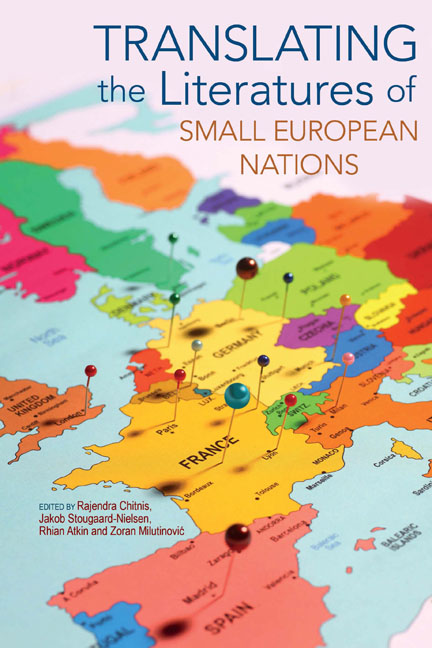Book contents
- Frontmatter
- Contents
- Acknowledgements
- Introduction
- 1 The Global Presentation of Small National Literatures: South Slavs in Literary History and Theory
- 2 Translators as Ambassadors and Gatekeepers: The Case of South Slav Literature
- 3 Supply-driven Translation: Compensating for Lack of Demand
- 4 Literature as Cultural Diplomacy: Czech Literature in Great Britain, 1918–38
- 5 Exporting the Canon: The Mixed Experience of the Dutch Bibliotheca Neerlandica
- 6 Creative Autonomy and Institutional Support in Contemporary Slovene Literature
- 7 Strategies for Success? Evaluating the Rise of Catalan Literature
- 8 Gender, Genre and Nation: Nineteenth-century Swedish Women Writers on Export
- 9 Translating as Re-telling: On the English Proliferation of C.P. Cavafy
- 10 Criminal Peripheries: The Globalization of Scandinavian Crime Fiction and Its Agents
- 11 Literary Translation and Digital Culture: The Transmedial Breakthrough of Poland's The Witcher
- 12 Towards a Multilingual Poetics: Self-translation, Translingualism and Maltese Literature
- 13 Does Size Matter? Questioning Methods for the Study of ‘Small’
- Coda: When Small is Big and Big is Small
- Index
9 - Translating as Re-telling: On the English Proliferation of C.P. Cavafy
- Frontmatter
- Contents
- Acknowledgements
- Introduction
- 1 The Global Presentation of Small National Literatures: South Slavs in Literary History and Theory
- 2 Translators as Ambassadors and Gatekeepers: The Case of South Slav Literature
- 3 Supply-driven Translation: Compensating for Lack of Demand
- 4 Literature as Cultural Diplomacy: Czech Literature in Great Britain, 1918–38
- 5 Exporting the Canon: The Mixed Experience of the Dutch Bibliotheca Neerlandica
- 6 Creative Autonomy and Institutional Support in Contemporary Slovene Literature
- 7 Strategies for Success? Evaluating the Rise of Catalan Literature
- 8 Gender, Genre and Nation: Nineteenth-century Swedish Women Writers on Export
- 9 Translating as Re-telling: On the English Proliferation of C.P. Cavafy
- 10 Criminal Peripheries: The Globalization of Scandinavian Crime Fiction and Its Agents
- 11 Literary Translation and Digital Culture: The Transmedial Breakthrough of Poland's The Witcher
- 12 Towards a Multilingual Poetics: Self-translation, Translingualism and Maltese Literature
- 13 Does Size Matter? Questioning Methods for the Study of ‘Small’
- Coda: When Small is Big and Big is Small
- Index
Summary
Poets from smaller European languages have always struggled to make their voices heard. Constantine P. Cavafy (1863–1933) presents us with a singular case of poetry translated into all major languages – indeed, retranslated at a rate unheard of for a modern poet – to the extent that we now speak less about a voice from Greece, primarily associated with a ‘small’ national literature. His publication history alone (listed at the end of this chapter) immediately shows how this body of work has long outstripped notions of minority; the fact that this poetry speaks for characters and settings that belong in the margins of antiquity, culture and sexuality makes this situation even more poignant. Though Cavafy's poetry nowadays exists in most languages, it is with English that a unique – even excessive – relationship has been forged. Alongside a wealth of imitations, in the early twenty-first century alone we can count at least ten extensive translation projects related to the accepted canon of 154 poems. There are rarely ‘second chances’ for a poet rendered into a major language, but in Cavafy's case, the consecutive acts of translation suggest not simply the reconfirmation of his value beyond his own culture, but the expression by translators and publishers of needs and desires, explored in this chapter.
For modern Greek writers, the enduring continuities with their ancient Greek counterparts – the diachrony of a language, where the gist of ancient texts can be somewhat understood without intralingual translation – are simultaneously a blessing and a curse. A key figure in the presentation of Greek literature to English-speaking audiences in recent decades, David Connolly (2003, 13, my emphases) laments in his foreword to a bilingual edition of a poetry collection by Yannis Kondos (1943–2015) how
translators of modern Greek poets are perhaps further disadvantaged in their efforts to communicate their tradition in the English-speaking world. The very fact of being obliged to refer to ‘modern’ Greek poets and not simply Greek poets is indicative of the problem. Experience has taught me that any reference to ‘Greek’ alone is invariably identified in the mind of the audience or readership with Greek antiquity. Many contemporary poets who have failed to make any impact in English translation have undoubtedly suffered from the legacy of Greece's ancient past and from a particular perception of Greece by Westerners.
- Type
- Chapter
- Information
- Translating the Literatures of Small European Nations , pp. 165 - 183Publisher: Liverpool University PressPrint publication year: 2019



